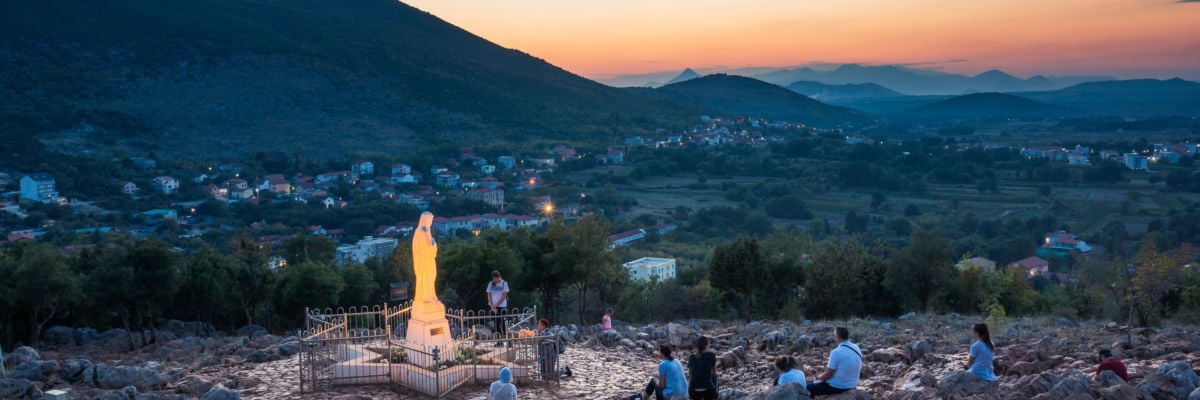
Traditionally, the Catholic Church has not endorsed “the spiritual experience” of a place of pilgrimage without at the same time confirming the supernatural character of the alleged private revelations associated with the shrine—stating, for example, that the apparitions reported by a seer is worthy of belief. But the Medjugorje saga, whose origins date to June 1981 in former Yugoslavia, has long defied ecclesiastical convention, and indeed helped shape new discernment norms, which permit the Church to recognize and encourage good fruits linked to reported private revelations without pronouncing on the revelations themselves.
In short, the Dicastery for the Doctrine of the Faith (DDF)—with the approval of Pope Francis—has made what can be termed a Solomonic decision: affirming that Jesus Christ and his Blessed Mother have wrought great fruit in the lives of more than forty million pilgrims over forty years, without deciding on whether the Virgin Mary has actually been daily appearing to six reported visionaries during that same period, and thereby not overturning the negative judgments by two previous bishops of the Diocese of Mostar-Duvno in the nation of Bosnia and Herzegovina.
The uniqueness of the place lies in the large number of such fruits: abundant conversions, a frequent return to the sacraments (particularly, the Eucharist and Reconciliation), many vocations to priestly, religious, and married life, a deepening of the life of faith, a more intense practice of prayer, many reconciliations between spouses, and the renewal of marriage and family life. It should be noted that such experiences occur above all in the context of pilgrimages to the places associated with the original events rather than in meetings with the “visionaries” to be present for the alleged apparitions (3, emphasis added). . . .
While this does not imply a declaration of the supernatural character of the phenomenon in question (cf. Norms, art. 22, §2)—and recalling that the faithful are not obliged to believe in it—the Nihil obstat [nothing obstructs] indicates that the faithful can receive a positive encouragement for their Christian life through this spiritual proposal, and it authorizes public acts of devotion. Such a determination is possible insofar as many positive fruits have been noted in the midst of a spiritual experience, while negative and dangerous effects have not spread among the People of God (38).
In doing so, the Church reaffirms that God is sovereign and therefore can write straight with the proverbial crooked lines of mankind: “A man’s mind plans his way, but the Lord directs his steps” (Prov. 16:9). That is, despite the imperfections of his disciples, God can bring good fruit in any case where the faithful sincerely respond to his spiritual promptings. Or, as St. Paul says, “We know that in everything God works for good with those who love him, who are called according to his purpose” (Rom. 8:28).
In effect, in its new document—“‘The Queen of Peace’: Note About the Spiritual Experience Connected with Medjugorje”—Pope Francis and the DDF have also affirmed the counsel Catholic Answers has long provided to pilgrims devoted to phenomena whose supernatural character has not been confirmed:
Those who have experienced conversions—or a deepening of faith—associated with pilgrimage(s) to Medjugorje should know that the validity of their experiences does not hinge upon whether the reported apparitions are declared of supernatural origin. Indeed, the sacraments are valid at Medjugorje, and the Blessed Mother can—and does—fruitfully intercede for those who seek her sincerely, wherever that may be.
In 2010, Pope Benedict XVI set up a commission to study the Medjugorje phenomena. The commission’s report, submitted to then Congregation for the Doctrine of the Faith (CDF) in 2014, was favorably disposed because of “the attestation of multiple Gospel fruits,” and so appeared to lay the groundwork for the DDF’s approval of devotion to the “spiritual experience” associated with Medjugorje.
The Church’s new discernment norms, which the DDF approved in May 2024, give the Holy See the final word in evaluating reported private revelations and related devotion, in contrast to traditional discipline that deferred to the judgment of the local diocesan bishop. These norms replace those established by Pope St. Paul VI in 1978. In issuing the new norms, the DDF stated, “It became evident that decisions took an excessively long time, sometimes spanning several decades. In this way, the necessary ecclesiastical discernment often came too late.”
Nevertheless, the DDF provides that local bishops retain spiritual oversight on devotion to Medjugorje in their respective dioceses:
Although there may be different opinions about the authenticity of some facts or certain aspects of this spiritual experience, the ecclesiastical authorities of the places where it is present are invited to “appreciate the pastoral value of this spiritual proposal, and even to promote its spread” (Norms, par. 17). However, the power of each Diocesan Bishop to assess prudently what is happening in his own territory and to make his own decision on the matter remains firmly in place (cf. Norms, art. 7, §3). While the positive fruits of this spiritual phenomenon are widely spread throughout the world, this does not deny that there may be groups or persons who, by misusing this spiritual phenomenon, act in a mistaken way. Each Diocesan Bishop, in his own Diocese, has the freedom and authority to make the prudential decisions he deems necessary for the good of the People of God (40).
The DDF concluded with wise spiritual counsel for Medjugorje pilgrims, as well as for anyone else who otherwise seeks to serve the Lord and his Blessed Mother:
In any case, may the people who go to Medjugorje be strongly advised that pilgrimages are not made to meet with alleged visionaries but to have an encounter with Mary, the Queen of Peace, and—faithful to her love for her Son—to encounter Christ and listen to him through meditation on the Word, by participation in the Eucharist, and in Eucharistic Adoration, as happens in so many shrines spread all over the world in which the Virgin Mary is venerated with the most varied titles (41).



